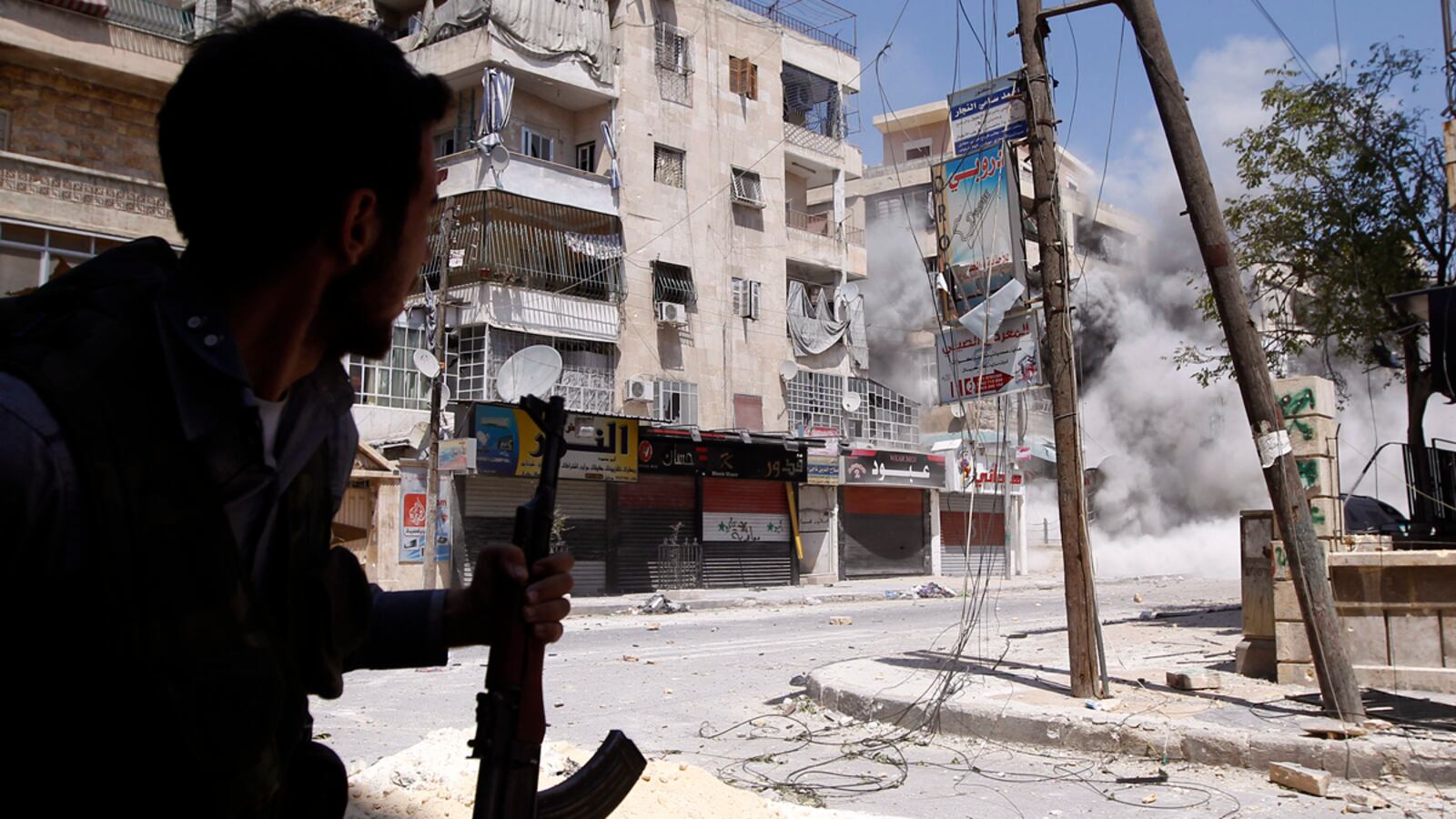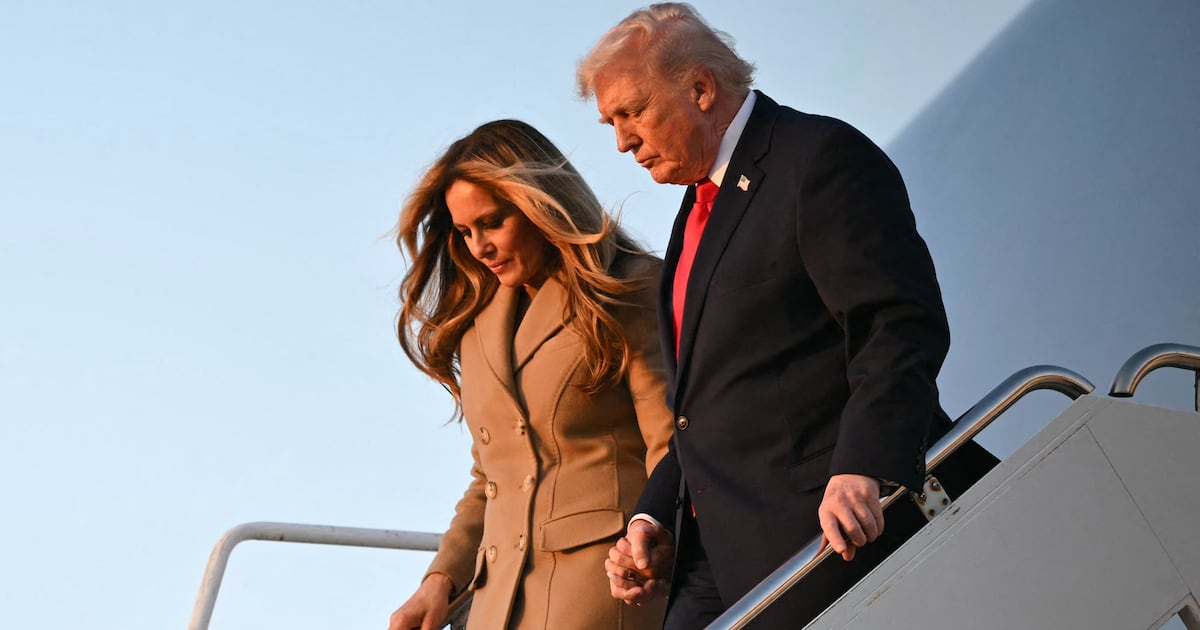Abu Fahdel squats down and rearranges his rockets, neatly pushing them up against the wall, his hands stained with melted lead. There are dozens of weapons stored in the bombed-out building on the outskirts of Al Bab and he had made all of them by hand.

“Look what I made,” he says holding up a gun defiantly. “I did that.” The gun is made out of what looks like pieces of wood and lead. It resembles a rifle and is probably just small enough to kill a bird. It definitely won’t last in street battles in Salaheddine, one of the bloodiest battlegrounds in Syria. The rest of the weapons are rockets set aside for the Free Syrian Army (FSA) to transport to Aleppo and use to fend of government forces.
Fahdel says he started making weapons for the FSA last year at the beginning of the revolution. He has been operating inside an old animal hospital that was bombed during a battle between rebels and Assad soldiers in May, its windows shattered and walls burned from fire exchange. The weapons are made in rooms that reek of chemicals, filled with leaking sinks and ammonium nitrate powder thrown across the counters.
Fahdel’s sons, grandsons, and close family relatives help him. The entire family sleeps in the building, Kalashnikovs by their side.
“We’re like a brotherhood,” he says wrapping his arms around the youngest, Akram, 18, and Fadallah, 16. For now, the young boys will not go back to school, but will help mix the explosive powder and meld the iron. They even test the rockets. They proudly show videos on their cellphones of rockets exploding into the air in an empty field.
Almost all of the materials used to produce the rockets are singlehandedly funded by the Al Baker FSA battalion based in Al Bab, a city that lies northeast of Aleppo. One of the rebels says the bags of ammonium nitrate are smuggled in over the Turkish border and brought directly to Fahdel, who stores them in his lab.
With 150 members, the Al Baker battalion is considered the largest and most active rebel group in the city of Al Bab. It works with four other battalions in the area, and sends close to 80 percent of its group into active combat. The other 20 percent stay in the city to work on administrative matters, such as checking in with Fahdel and the production of new weapons. The rockets seem to be helping in the streets of Aleppo, but they cannot stop the Assad’s forces from dropping bombs on their city.
Sheikh Mohammed Zaher Shurkat, the leader of the battalion, says they have been waiting for outside investors to send weapons that will help them shoot down aircrafts, but they have yet to arrive. “I don’t think they will ever come,” he says.
More than six bombs fell on Al Bab within 48 hours and government planes continued to fly over the city Friday. The battalion is doing its best to sustain the support of the civilians living in the area and to protect them as well as they can. But they know that there is nothing they can do to fend off the deadly airstrikes without the right weapons.
Instead, the rebels are working to keep Assad supporters out of their province. “We have eyes in all the streets of Al Bab,” he says. Shurkat says the battalion pays citizens to work in their intelligence unit.
The group arrested two Assad soldiers during a confrontation with government forces last month and brought them to a makeshift prison, where they reside today. The prison, which used to be a bank, is located in Al Raie, just outside of the the city limits of Al Bab. FSA soldiers man the entrance to the prison, each one holding their AK-47. Several of the rebels look no older than 15 or 16 years old. The official fighting age for the FSA is 20.
The prisoners, both Alawite, are waiting until the FSA finishes their investigation before being released. One of them,Yasser Hader, served for 14 years in the regime. He says that if the FSA wants him to join their forces he is ready to fight.
“The regime fed us wrong information. They didn’t want us to know that the FSA had a real cause,” he says. “Now I understand. I saw the airstrikes and the killing by the regime.” But as tensions inside Aleppo province continue to escalate and the death toll rises, FSA battalions in the area are unwilling to let down their offenses.
A group of rebels from the Al Baker battalion sat in a circle on straw mats in an apartment in Al Bab. Several fighters have come through the Turkish border this week. All of them will share the floor space tonight to sleep before heading to Aleppo in the morning. The group just lost one of their officers in the fighting, just one of 24 martyrs who have died since their battalion’s formation five months ago. Many will leave families and friends in Al Bab with the hope of returning next week.
“Maybe I will die and become a martyr,” one of them says turning toward me. “Will you write about me?”






